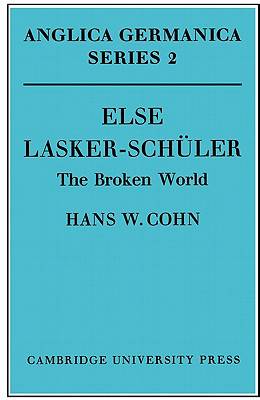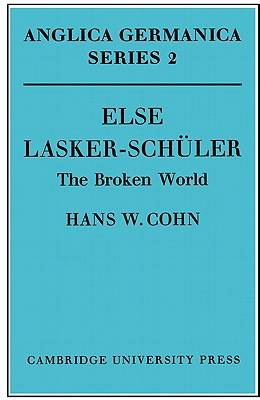
- Afhalen na 1 uur in een winkel met voorraad
- Gratis thuislevering in België vanaf € 30
- Ruim aanbod met 7 miljoen producten
- Afhalen na 1 uur in een winkel met voorraad
- Gratis thuislevering in België vanaf € 30
- Ruim aanbod met 7 miljoen producten
Zoeken
€ 60,95
+ 121 punten
Omschrijving
Else Lasker-Schüler (1869-1945) was a German-Jewish poet who died in exile in Jerusalem. This 1974 book was the first full-length treatment of her poetry in English. The aim of the author, a practising psychologist at the time of this book's original publication, in this study of the poet's life, was to see poetry as an expression of the deeper urges of the psyche. The book takes as a point of departure Peter Hille's remark that Lasker-Schüler was a 'Sappho whose world had broken apart'. Her world of experience was a constant swing between extremes: an intense longing for communication which, thwarted, led back to isolation and despair. The wish for contact and withdrawal from reality often coexist in irreconcilable conflict, only resolved by the poet's own acceptance of things as they are. She came closest to such acceptance in her search for God, which led to her religious poetry.
Specificaties
Betrokkenen
- Auteur(s):
- Uitgeverij:
Inhoud
- Aantal bladzijden:
- 176
- Taal:
- Engels
- Reeks:
Eigenschappen
- Productcode (EAN):
- 9780521168366
- Verschijningsdatum:
- 11/08/2011
- Uitvoering:
- Paperback
- Formaat:
- Trade paperback (VS)
- Afmetingen:
- 140 mm x 216 mm
- Gewicht:
- 231 g

Alleen bij Standaard Boekhandel
+ 121 punten op je klantenkaart van Standaard Boekhandel
Beoordelingen
We publiceren alleen reviews die voldoen aan de voorwaarden voor reviews. Bekijk onze voorwaarden voor reviews.











